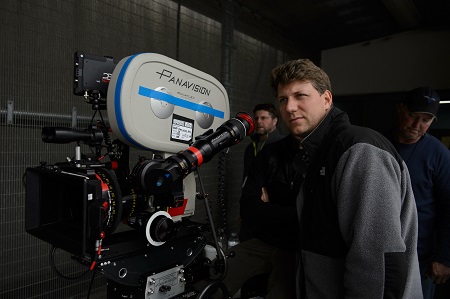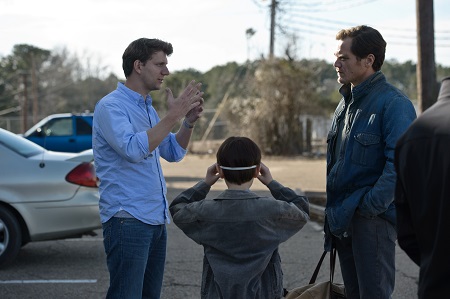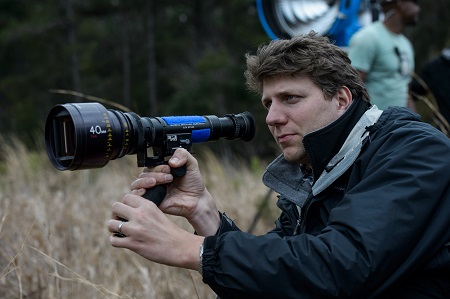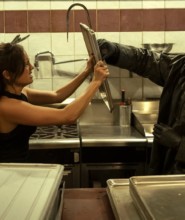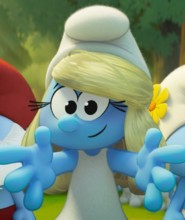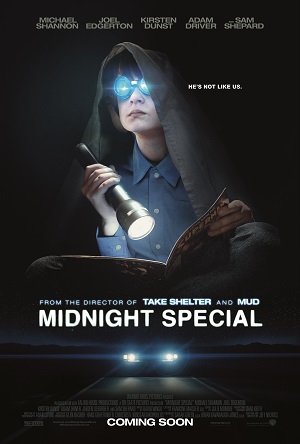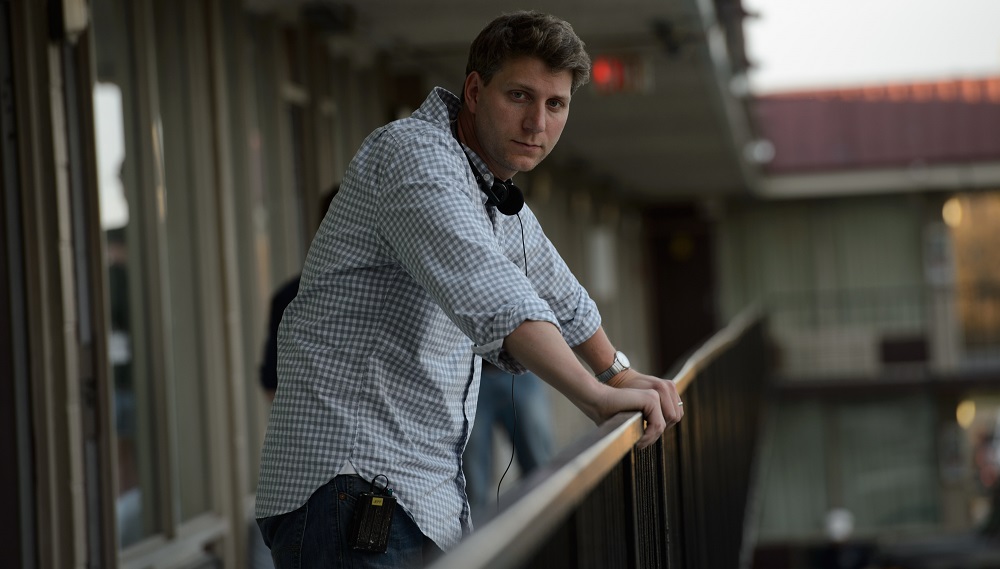
“Midnight Special” – Interview with Jeff Nichols
by Sara Michelle Fetters - April 1st, 2016 - Interviews
Facing the Inevitable
Writer/Director Jeff Nichols Defines Parenthood Aboard the Midnight Special
Writer/Director Jeff Nichols’ latest cinematic venture Midnight Special concerns itself with a driven father, played by frequent collaborator Michael Shannon, who kidnaps his only son from a reclusive religious cult. Hitting the road with his son and a rogue state trooper, the trio are doing all they can to make it to Florida by a predetermined date. On their trail is the U.S. Federal Government, most notably a secretive NSA scientist portrayed by Star Wars: The Force Awakens and While We’re Young star Adam Driver, his reasons for doing so going way beyond matters of national security.
The movie is an otherworldly blend of genre influences ranging from Close Encounters of the Third Kind, to Starman, to The Sugarland Express, to Thelma and Louise, the acclaimed filmmaker behind critical favorites such as Mud and Shotgun Stories playing things relatively close to the vest throughout. Originally set for release at the tail end of 2015, Nichols’ latest endeavor ended up sitting on the shelf for a little while as Warner Bros attempted to figure out what to do with it, the film not exactly an easy one for the studio to figure out how to sell to the general public.
“I finished it in June of last year,” Nichols says with a laugh. “To Warner Bros credit, I think they want the film to succeed. It’s a tough sell, a tricky film to put out into the world, and I think when they were looking at the release schedule they were admittedly worried it would get decimated by Star Wars. Additionally, this is not me not having an ego, but I also think the comment is fair, I didn’t deliver them a traditional awards contender.”
“You’re free to muse about why that is, but, that aside, when you look at the films it would have competed against in the big budget arena, and you look at the art house films, the so-called awards contenders, it would have competed against, it just didn’t make sense to release it at that time. I think waiting until now, late March, early April, this was the right decision. I think there’s freedom here for it to grow and hopefully find an audience.”
“I did go and make another movie while we were waiting,” he adds with a chuckle. “I did do that.”
As potentially supernatural as things might end up becoming in Midnight Special, it’s still easy to see how this film fits right in line with the director’s previous three efforts, Shotgun Stories, Take Shelter and Mud. “They’re all reflections on myself,” he states matter-of-factly. “I keep growing. My life keeps changing. My point of view keeps changing. Hopefully, that means the movies themselves will keep changing.”
“The more obvious thing, though, is that I don’t like to be classified with a genre, so I hop around within those sort of things. I’m just struck by different ideas. With Take Shelter, I remember it very vividly. I had this image of a guy standing in my backyard over a storage shelter with the doors open. It just kind of came to me. I took my wife out to lunch and I was like, what if I made a movie about a guy who was having these dreams about a crazy storm, so he built a storm shelter, and all the other facets of the screenplay were born out of that idea. Ideas like that, they just sort of float around and you attach yourself to them.”
“With Midnight Special, I had this idea of these two guys in the black car moving very fast through these rural back roads only it was night, and there was little to no light at all. I just started building it out from there. This film, especially because it is a chase film, I actually got pretty far along with the plot before I literally had to put on the brakes. I had all these elements. I had the genre identified. I knew it was a father-son story. But what was it all about? How did it connect to anything? And that’s when I really started reflecting back on my own life, which is something I’ve done on all my films, and that’s how I found what the emotional core of the movie was.”
And what exactly does the filmmaker mean by that? “It’s when I started thinking about my own son,” he says candidly. “It was then that Michael Shannon’s character started to take shape. It was at that point Kirsten Dunst’s character also started to take shape. And it was really where the whole emotional trajectory of the film started to happen. I think, if there is any hallmark to what it is I do, I put that emotional trajectory ahead of the rest of it. I mean, I was diligently working on the plot details, all of the cool elements, the cool things, but those are always less important to me than the emotional component. That’s the most important element.”
Family, especially fathers and their relations to their children, are a key component to all of the stories the director has chosen to tell at this point. It’s the one core component that connects each film to the one that came after it. “I’d agree, but I do think Take Shelter has more to do with marriage than it does with the father-child component,” says Nichols with a slight shrug. “I wrote that film as I was about to be a father, so it was certainly a reflection of fatherhood as a position, as a responsibility, adulthood as a responsibility, but the core had more to do with Michael Shannon and Jessica Chastain’s relationship, I think.”
“But, yeah, he was a father, he had children, he wanted to save them all,” he says with a coy grin, “so, yeah, I guess you could still go with that. It is about a father and his children. Definitely. I guess you can say fatherhood is a definite theme in all four of my movies.”
“It’s all sort of happened by happenstance,” Nichols admits freely. “I certainly draw from my position as a father when I write, Midnight Special specifically. But I grew up in like an “Ozzie and Harriet” kind of household. My parents were great. They are great. They were kind of insanely supportive of my brothers and I, supportive of our desires to not get nine to five jobs and let us take a chance in regards to what it was we wanted to do. So, no, they’re not exactly good fodder for dysfunctional family material.”
“Certainly with Shotgun Stories, that just happened very organically. I knew I could tell a story about the fear of one of my brothers dying. This was before I was married, and probably the most intense and closest relationships in my life at that time were with my brothers. We’re all very close. And, I remember hearing this Drive-By Truckers song ‘Decoration Day’ about a feud and, again, this image just popped into my head of a guy spitting on a casket. Why would they let someone that close to a graveside casket? Who could that be? It had to be because he was a relative, and that’s where the half-brothers came from. That naturally meant that the father character had to be this divisive force.”
“It all just went tick-tick-tick. It was a row of dominoes. And it wasn’t like I was setting out to make some crazy father saga. It just made sense for that story.”
“Likewise with Mud, when I learned this detail about how these houseboats on the river, if the person whose name the house was under left and the state could take over the property, it just made sense that the mother character would want to leave, that the father would want to stay, but that the houseboat was in her name giving her all the power. To have this boy’s family dissolving, in this time when he sorely needed a male mentor, it all just fit together just from me learning that one tidbit of information pertaining to houseboats on the Arkansas River.”
“In that way, I think Take Shelter and Midnight Special hold a special kinship as it pertains to what it is we are talking about. These films, it really is me in my life looking at my life and using the relationships in my life to figure out the stories I am wanting to tell. In that way, they are more immediate.”
Granted, it’s a big jump to go from a vision of two guys sitting in a car hurtling through the darkness on a clandestine road trip to a science fiction-based saga bordering on the supernatural. “About eight months into my son’s life, he had this seizure,” says Nichols. “It was the kind of thing that happens to like one in a thousand kids. No long term effects. It is the type of thing most grow out of by the time they are five, things just relating to how the body processes fever.”
“But we didn’t know that. Nobody told my wife and I that. We flipped out. We thought he was dying, and it was the type of thing that shocked me awake during that first year of fatherhood when you’re just thinking about sleep deprivation and how much your life sucks, made me realize just how precious this kid was. I was gripped with this fear, and fear is actually a great place to start movies from. Fear is where I started Shotgun Stories and where I started Take Shelter from, and Midnight Special ended up following suit.”
“But fear is in and of itself not a complete thought. It is a catalyst for a thought. It, fear, is also not what the movie is about. What that fear did do is force me to try and define parenthood. The definition I came up with is really the character arc or the character trajectory that Michael Shannon and Kirsten Dunst’s characters take.”
This really gets to a little bit higher level of feeling I was trying to get at. When I was in the middle of writing the film, Sandy Hook happened. That devastated me. This seemed to amplify this very specific feeling I was having when my son was sick, calling out to the rest of the world what I was feeling. These tragedies could happen. They could happen anywhere. It’s f**king devastating. F**king terrifying.”
“So, I found myself, in the middle of writing this silly sci-fi chase movie, trying to express this really personal thing I felt like was suddenly resonating with the rest of the world. When we lose our children, how do we deal with that? How do we deal with that fear that comes from the inevitability that we know that, someday, maybe sooner than we want, they are going to leave us? That is the cycle of parenthood. We hope they leave us organically, but the point still is that they will leave us. What do we do? How do we deal? Because we still have to put one foot in front of the other, and we have to still raise our children even knowing the inevitable will someday come to pass.”
And did Nichols come up with an answer? “I came up with my own definition,” he proclaims. “I think the conclusion is that we keep trying to find who are children are. Not who we want them to be. Not what we want them to grow up to be. But who they are for themselves and, as they grow, you can help redefine that for them. So that, by the time they leave, hopefully they know who they are. That they know what they want to do in the world. I think this is the definition of parenthood, and that’s all Michael Shannon and Kirsten Dunst are trying to do in this movie. They’re trying to understand who their boy is.”
– Interview reprinted courtesy of the SGN in Seattle
